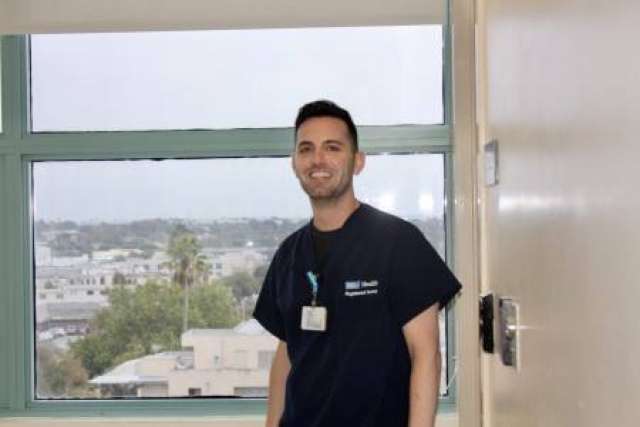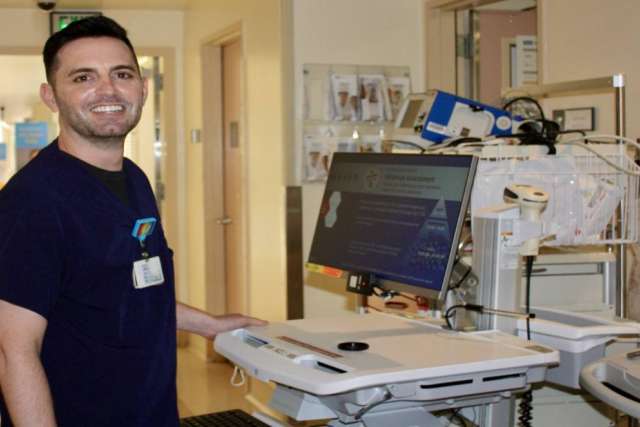Whether or not he’s on the clock at UCLA Santa Monica Medical Center, Randy Lawrence, MSN, RN, PCCN goes above and beyond what’s required.
He’s voluntarily taken on leadership roles, encouraged his colleagues to share their ideas and spent his own time and money to help patients in need.
Lawrence’s dedication has been recognized by Working Nurse magazine, which features him in its annual “Men in Nursing” issue, published Nov. 17.
“Randy is the epitome of the professional nurse,” says David Bailey, PhD, RN, chief nursing officer for UCLA Santa Monica Medical Center. “He is clinically excellent and serves as a leader and role model for his team in intermediate care. But he is so much more. He is involved professionally at the hospital and system level in Professional Governance to ensure that the patient and nurse voices are always present where decisions are made that affect both.”
For Lawrence, working as a clinical nurse in the intermediate care unit offers endless opportunities for growth. Not only is it a challenging assignment — “We’re one step down from the ICU, so we’re a jack-of-all-trades floor,” he says — but he’s been encouraged to expand his skills off the floor as well.
He arrived at UCLA Health right out of nursing school and has grown to become a leader in his department, joining every initiative he could, from his floor’s Unit Practice Council to the Transformational Leadership Council to the Nurse Executive Council, which he helped lead.
“What I love about nursing is there are so many things we can get involved with,” Lawrence says. “These experiences have shown me the difference a bedside nurse can make with their voice to help direct patient care and improve conditions for staff. What I’m hoping to do now is get more people involved. Nurses think that being a nurse practitioner is the next step, but there’s so much more we can do.”
Focused on his patients
The COVID-19 pandemic injected uncertainty and fear into an already demanding job, but Lawrence kept his focus on the people he serves.
“We just knew what we had to do, because our patients were sick and that’s what we were here for: to help our patients,” he says. “Now that we have the vaccines, a little bit of the pressure is off. It’s not as scary every day going to work.”
Lawrence’s deep regard for his patients extends beyond his work day. He tells a story about a man who had been living at a halfway house before coming to the hospital for congestive heart failure complications.

An exam at intake found that this heavyset man with unruly long hair and a large, bushy beard was infested with lice. Nurses treated the man, but the lice problem persisted because he had so much hair.
Lawrence explained to his patient that they needed to cut his hair to remedy the issue.
“He was very hesitant, because he said his beard was part of his image. He couldn’t imagine himself without it,” Lawrence recalls. “But over the course of the day, we made a connection and he allowed me to take scissors and a razor to his hair and his beard. He was actually happy with the way he looked.”
But the man worried that his clothes might be infested with lice as well, and they were the only clothes he had. UCLA Health keeps clothing and supplies on hand for people who are homeless, Lawrence says, but none were large enough to fit his patient.
So that night, on his way home from work, Lawrence stopped at a store and bought a triple-extra-large sweat suit. He was off work the following day, but went in anyway and left the new clothes in a bag by his patient’s bed. By the time Lawrence returned to work, the patient had been discharged.
But about a week later, Lawrence got a phone call at the hospital. It was this patient.
“He said finding the clothes by his bed was like waking up on Christmas morning,” Lawrence remembers. “He said he felt like a completely new man and it was the motivation he needed to make his life better and get his health in better shape. It gave him a whole new outlook on life.”
Making that extra effort in caring for patients is what makes Lawrence’s job meaningful, he says.
He harkens back to advice he received early in his nursing career: Use your resources to find a small way to impact your patients.
“As a bedside nurse, we don’t always see the impact we’re having on our patients. We’re just a moment in their very acute sickness,” Lawrence says. “So it’s important to know you are making a difference for them by caring for them, making their stay in the hospital a positive one and helping them get better.”
Learn more about UCLA Nursing.



